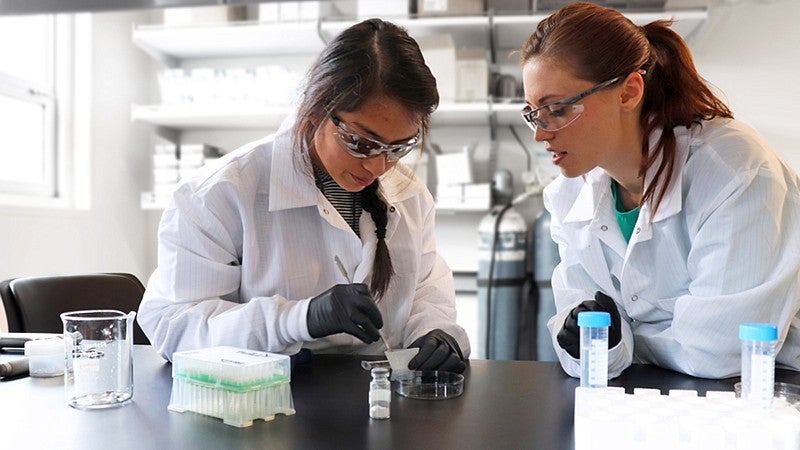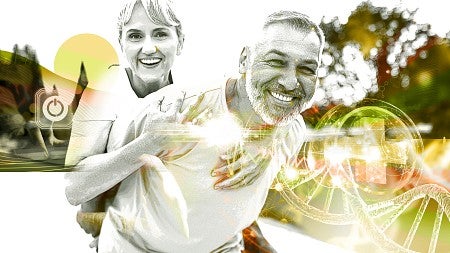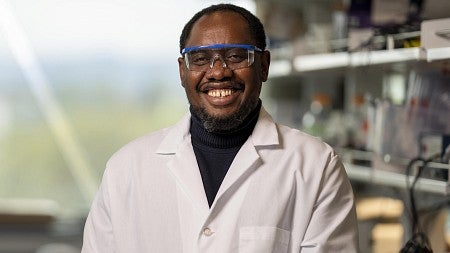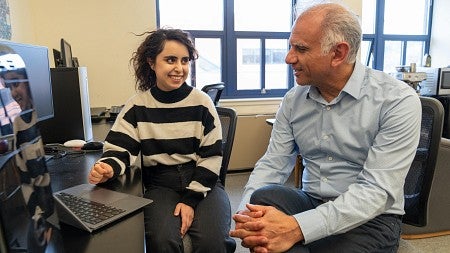
Knight Campus Puts Students on Fast Research Track
New research programs allow undergraduates to work with mentors in prestigious UO labs
By Rachael Nelson • Photo by Rachael Nelson • October 2, 2019
5 min read
Standing at a laboratory bench and clad in a white coat and mirrored safety goggles, University of Oregon biology major Michelle Hernandez begins to test blood samples for signs of inflammatory biomarkers.
Next to her is scientist and mentor Kelly Hyland, who keeps a watchful eye and offers tips as Hernandez spins the samples in a centrifuge, then prepares to use micropipettes to extract portions of the fluids for analysis.
Before beginning, Hernandez looks to Hyland for guidance on how to hold a blood sample tube at the correct angle.
“I haven’t performed this part yet,” she says to a bystander. “I am always doing something different in the lab. There is never a ‘typical’ day here, so there is never a dull moment.”
Hernandez, a member of the class of 2021 from Aliso Viejo, California, is one of six students immersed in a rare research opportunity through the new Knight Campus Undergraduate Scholars Program. This yearlong experience pairs promising young scientists with mentors in prestigious UO labs.
Hernandez is studying regenerative therapies for osteoarthritis. Since January, she has worked in a campus lab with Hyland, a research engineer in the lab of Robert Guldberg, Robert and Leona DeArmond Executive Director of the Phil and Penny Knight Campus for Accelerating Scientific Impact. The first phase of the UO’s $1 billion research complex opens in 2020, uniting students, faculty members, scientists, and industry representatives to fast-track discoveries into solutions that improve lives.
On Franklin Boulevard across from campus, construction crews are working day and night on a $225 million, 160,000-square-foot facility that will strengthen ties between research and industry players such as Thermo Fisher Scientific. The leading biotechnology company is underwriting the cost of two of the six undergraduates in the program, including Hernandez.
But in its commitment to developing societal benefits, the UO isn’t waiting for the first Knight Campus building to open—it’s accelerating the pace of progress. Scientists who will move to the Knight Campus have already begun work in upgraded labs in Pacific Hall, providing invaluable role models and guidance for Hernandez and other aspiring young researchers.
The fresh approach to partnerships that underpins the Knight Campus and the scholars program is exemplified by the access that Hernandez enjoys to someone with Hyland’s experience. The research engineer earned her master’s degree at the Georgia Institute of Technology where she met Guldberg, a leader in regenerative medicine who studies muscle and bone growth; he joined the UO in 2018 as Knight Campus vice president and executive director.
“It’s my job to make sure Michelle is building transferable skills,” Hyland says of her mentorship experience with Hernandez. “Those are the things that can really jump-start the next step in her research career.” By the end of the program, Hernandez will have a suite of research and medical skills that include microscopy and sterile surgical training.
For now, Hernandez is focused on sampling and evaluating synovial fluid and blood, which involves intricate measurements of growth factors and identifying reliable biomarkers that provide information on the status and progression of degenerative joint disease.
She was apprehensive when she first set foot into the lab because she didn’t have research experience. But Hyland’s invaluable mentorship has given her confidence.
“It was a little overwhelming at first while taking rigorous course work, but Kelly has guided me through every step,” says Hernandez. “It’s been so eye-opening and amazing.”
Says Guldberg: “This fast and formative real-world experience for high-performing students is exactly what we had in mind when we designed the Knight Campus Undergraduate Scholars Program.”
Before he became a highly regarded bioengineer, Guldberg was an undergraduate at the University of Michigan, eager to gain practical research experience. “I went knocking on the doors of different laboratories to see if someone would take me in and give me some research experience,” he says. “I ended up landing in the orthopedic bioengineering lab in the surgery department. That shaped my future in an amazing way.”
“We plan to significantly expand the undergraduate scholars program in the coming years to provide more students with opportunities to develop professional knowledge and skills, and see firsthand what graduate school or a research career in industry would be like,” Guldberg says.
In the meantime, Hernandez says the knowledge she has already gained has encouraged her to dream big.
“When I started this program, I wasn’t sure if I wanted to go into the medical field or apply for a doctoral program,” Hernandez says. “Throughout this experience, I have developed a passion for research, and I want to continue that research to hopefully make a difference in people’s lives, whether that is through teaching or scientific discovery. I know that the knowledge and skills I’ve gained here will help me during the next chapter of my career.”
Knight Campus Undergraduate Scholars
Michelle Hernandez is one of six mentored for a year of research through the Knight Campus. The cohort includes these Oregonians:
Emily Niebergall
Hillsboro, Oregon; class of 2020 (biology)
Mentor: Emily Beck, postdoctoral research associate
Faculty Laboratory: Bill Cresko
Disease modeling of threespine stickleback fish, adaptive immune systems, and cell-mediated immunodeficiencies
Ian Torrence
Eugene, Oregon; class of 2021 (biochemistry)
Mentor: Sean Fontenot, research associate
Faculty Laboratory: Darren Johnson
Development of chemical sensors for measurement of environmental nitrate, ammonium, and ions which affect the health of soil and freshwater ecosystems
Russell Nickels
Brookings, Oregon; class of 2020 (human physiology)
Mentor: Hazel Fargher, PhD candidate
Faculty Laboratory: Darren Johnson and Michael Haley
Creation of water-soluble, fluorescent molecular probes that bind to anions to aid in the understanding of biological mechanisms
Robin Black
Lookingglass, Oregon; class of 2020 (biology)
Mentor: Michelle Massaquoi, graduate student
Faculty Laboratory: Karen Guillemin
Analysis of host-microbe interactions and gut bacteria in zebrafish
Dan Tudorica
Portland, Oregon; class of 2020 (biochemistry)
Mentor: Arden Perkins, postdoctoral fellow
Faculty Laboratory: Karen Guillemin
Biochemical experiments on proteins and the study of cell biology and how bacteria respond to their environments, important in understanding human disease
Rachael Nelson is a staff writer for University Communications.




